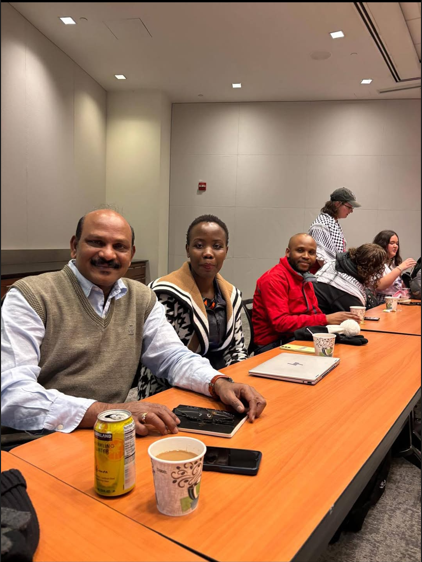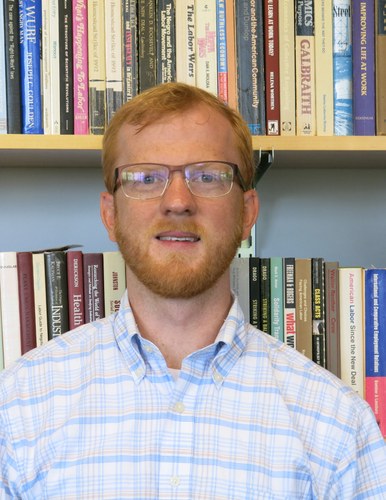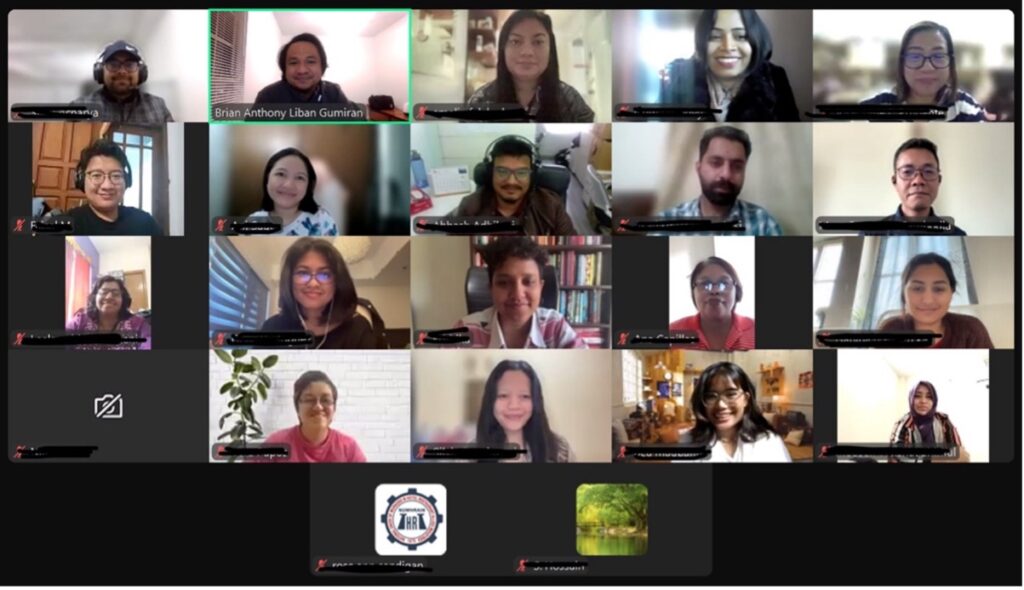Michael Burawoy’s Legacy: Sociology as a Call to Action
Jafar Iqbal (Bangladesh), LGWR Alumni
Could anyone imagine a life without a phone or a car? Michael Burwaoy could!
When I met him in 2022 at Penn State, I asked for his number, and he simply replied, “No phone, no car, no wife.” His devotion to sociology was absolute—more than an academic pursuit, it was his life’s mission. He provided tools to understand how workers, from Zambian copper mines to American factories, are exploited through ideological regimes and economic structures. He reclaimed sociology from serving the status quo, using it as a force for the marginalized.
I first encountered his work in my labor sociology course when I was an LGWR student (2019-2020). His research on production politics and global ethnography shaped my dream of studying garment factories in Bangladesh. Michael was more than a scholar; he was a force—radiating humor, energy, and passion in the classroom. Conversations with him were never just intellectual exercises but calls to action, urging us to bridge scholarship with real-world struggles.
In February 2025, I learned he had been killed in a hit-and-run—by a car he never wished to use. But Michael is not gone. His legacy endures in the questions he posed, the
scholarship he produced, and the students he empowered. His work challenges us—not just to understand the world, but to change it.


New GLU track in Labor and Global Workers’ Rights at Rutgers
The Global Labour University (GLU) is opening a new GLU Track in Labor and Global Workers’ Rights within the master’s degree in labor and employment relations at Rutgers University (New Brunswick).
The Rutgers GLU Track has two phases: the Workers’ Rights Online Graduate Certificate (4 courses, 2 semesters), and the in-person master’s degree in labor and employment relations (9 courses, 2 semesters).
This two-year program has a rolling admission up to Thursday, July 3, and the online portion will begin on Tuesday, September 2.
The CGWR became a new associated member of GLU last year, and will continue its work supporting faculty research on global workers’ rights.
LGWR Students Participate in the SILS Conference
Raja Vailankanni (India), LGWR Student
Reachel Nahwera (Uganda), Lawrence Mashabela (South Africa), and I were part of the Students for International Labor Solidarity (SILS) Conference in Washington, D.C. from January 31 to February 2. It was refreshing to see the highly charged youngsters and advocates of worker rights, ‘the leaders for tomorrow in the making.’
SILS is a committed student-led group from universities across the United States advocating for labor rights, supporting garment workers globally, and holding major brands and universities accountable for labor rights violations, such as wage theft, and failure to ensure minimum labor standards. SILS has highlighted several such cases to the university administrations (e.g., Penn State, New York University, University of Michigan, University of Pittsburgh, etc.) and the student community to ensure major brands follow ethical business practices down the supply chain.
The SILS conference was a mix of promoting organizing and workshops beginning with the guest speakers from the Worker Rights Consortium (WRC) who talked on “The role of independent monitoring,” followed by Evangelina Argueta union leader from the Maquilla Organizing Project of the CGT (Honduras) on the struggles and success of garment workers in Honduras giving great insights on the need for international solidarity. Evangelina was part of the research team of the CGWR report “Bargaining for Decent Work and Beyond” in 2022.
Training and activities were conducted around developing solidarity, building coalition, and sustainable groups on campus, developing new leaders, and working on the Nike/Hong Seng campaign strategy. The attendees participated in the ‘Starbucks worker united call’ and the ‘UFCW solidarity action’ at the REI store in Washington, D.C.
SILS’ deep commitment, and concern for fellow humans, suffering somewhere in the invisible world speaks volumes of the growing solidarity and fellowship only unions can build. I wish SILS great success in their endeavor in making the world a little better!


Reports by CGWR Faculty
Mark Gough, a CGWR Faculty, published “Contracts That Bind: Untangling the Use of NDAs, Forced Arbitration and Other Restrictive Covenants in the U.S. Labor Market”. This report explores the frequency of common restrictive employment covenants, including mandatory employment arbitration, non-compete agreements, non-disclosure agreements, non-solicitation clauses, and class action waivers, and their impact on various demographic groups across the U.S. economy. Based on a survey of 947 job seekers over the summer and fall of 2024 the report shows that 39 percent of workers report being subject to a Mandatory Arbitration Clause, Black and Asian workers generally report being subject to restrictive covenants at higher rates than Hispanic and white workers, and women generally report being subject to restrictive covenants at slightly higher rates than men. This report has been cited by The New York Times and the Business Insider.
Mark Gough’s second report, with Harry C. Katz, examines the current state of generative AI adoption and perceptions through a survey of 219 members of the National Academy of Arbitrators. The “Generative AI and the National Academy of Arbitrators” reveals a profession that remains largely hesitant to integrate AI into neutral work with some signs of emerging interest, particularly for specific use cases like summarization and research, indicating a cautious path forward.


Film screening and discussion: "An Injury to One"
Leo Tang (Hong Kong), LGWR Student
“An injury to one is an injury to all. ” This slogan, printed on a t-shirt by the Hospital Authority Employees Alliance (HAEA), a Hong Kong union that led a five-day strike during the early days of the COVID-19 pandemic, echoes a century-old motto used by the Wobblies. Little did they know, these words would transcend time and space, landing on the backs of striking hospital workers in Hong Kong in 2020.
Last January 22, I had the honor of participating in a post-screening discussion organized by CGWR and Penn State Sustainability. Directed by Travis Wilkerson, “An Injury to One” tells the story of a forgotten union strike, a forgotten labor leader, and a forgotten city—Butte, Montana. This experimental film explores Butte’s rise and fall as an industrial mining town in the nineteenth century, highlighting both the growth of the mining industry and worker solidarity. As the industry collapsed, the town was left grappling with environmental crises that persist to this day.
Wilkerson uses Butte as a metaphor for the consequences of unchecked capital, linking past struggles to present realities. The cost of labor struggles was immense—Frank Little, the Wobbly leader, was murdered, hundreds of miners died, and the miners’ union was dismantled. History repeats itself. HAEA reached its peak in 2020, only to be crushed two years later amid Hong Kong’s crackdown on civil society.
Yet, their stories endure. Wherever we go, we leave traces. Continuing to tell their stories is an ongoing act of resistance.
Labor Education in Korea
Jaeung Kim (Korea), LGWR Professor
As a result of the 1997 Asian financial crisis, the labor movement in South Korea has faced numerous challenges, including the rise of neoliberalism externally and the weakening of class consciousness within labor unions. In particular, individual economic concerns have increasingly taken precedence, leading to a decline in workers’ solidarity. To address this crisis, Korean labor unions have invested significant organizational, material, and human resources into workers’ education.
The Korean Confederation of Trade Unions (KCTU) has made substantial efforts to cultivate workers’ political consciousness beyond economic issues from a long-term perspective. To strengthen solidarity at all levels—from national to industrial to grassroots—various unions affiliated with KCTU integrate workers’ experiences and everyday concerns into educational content while placing dialogue at the center of their pedagogical methods. Most importantly, labor unions train workers to become educators themselves and implement train-the-trainer programs to facilitate grassroots organizing and social change.
Since the declaration of martial law on December 3—although the order was lifted after three hours—South Korea’s democracy faced a significant crisis. The labor movement, led by the KCTU, remains at the forefront of the struggle against the authoritarian regime. In this critical moment, whether workers can position themselves at the center of systemic change—beyond merely defending democratic institutions—depends on the labor movement. Achieving this will require more than just protests in public squares. It will necessitate continuous education and the facilitation of learning activities within labor unions, workplaces, and workers’ daily lives.
Find related materials and presentation recordings here from a CGWR co-sponsored event.


LGWR Student Tutoring the GLU ENGAGE Program in Asia
Brian Gumiran (Philippines)
The University of the Philippines Diliman School of Labor and Industrial Relations (UP-SOLAIR) and the Global Labour University (GLU) host the second ENGAGE Asia program from March to July this year. The program is a non-degree certificate course for trade union organizers, labor activists, and researchers in Asia, aiming to provide knowledge and skills to better understand and advocate for workers’ rights in the region. For this cohort, the ENGAGE has twenty-two students from Bangladesh, Cambodia, India, Indonesia, Nepal, Pakistan, Philippines, Thailand, and Vietnam. The course is a combination of online sessions, and residential, in-person sessions hosted at UP-SOLAIR.
I am fortunate to be involved as an online tutor in two modules of the course about Global Governance and the Role of Labor, and Industrial Policy, Wages, and Collective Bargaining. As a tutor, I am responsible for tracking and encouraging progress in the assigned online Massive Open Online Course (MOOCs) hosted by GLU, as well as facilitating an online session that discusses key issues discussed by the online course. Last month, I facilitated the first tutored course where we talked about how global supply chains (GSC) affected workers in their countries, and how trade unions and workers’ movements can engage the state and employers and build international solidarity through different GSC regulation strategies.
The ENGAGE ASIA program is also supported by the Friedrich-Ebert-Stiftung (FES), the Norwegian Confederation of Trade Unions (LO Norway), and the International Transport Workers’ Federation (ITF).
This publication is available in alternative media on request. Penn State is an equal opportunity, affirmative action employer, and is committed to providing employment opportunities to all qualified applicants without regard to race, color, religion, age, sex, sexual orientation, gender identity, national origin, disability or protected veteran status. UBR CLA 25-275